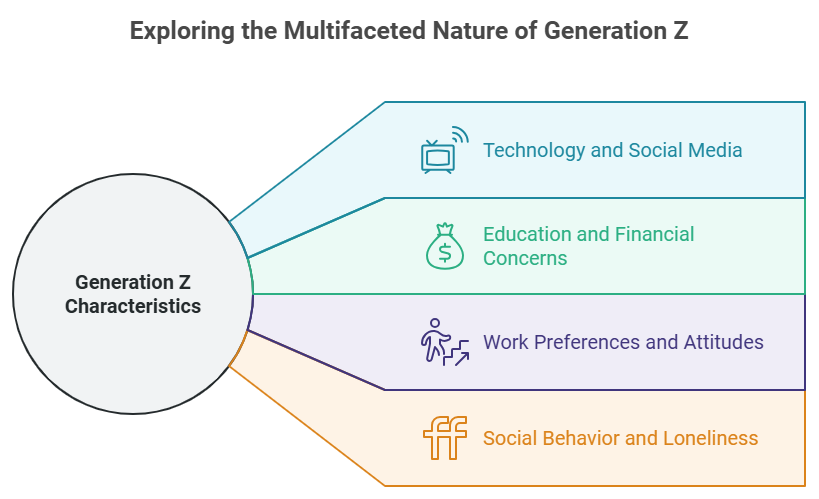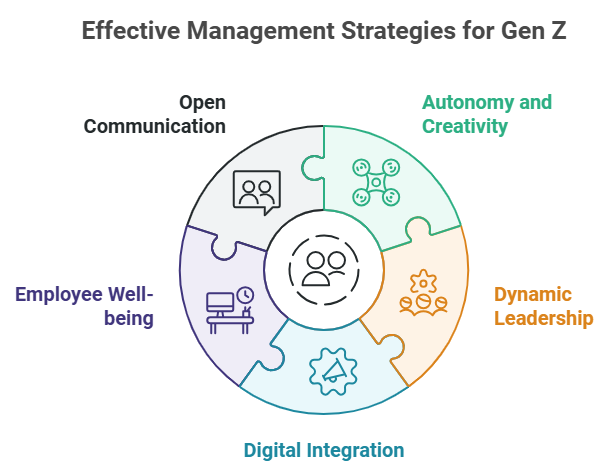
You have just started understanding how Generation Y works and learned how to manage and retain them. However, a new generation is replacing them: Generation Z. They are born with a digital device in hand, headphones in their ears, and a touch screen always close by. This will be the workforce of tomorrow. Born after 1996, they have a very different vision of the world of work and their needs and methods may significantly shake up your habits and force you to rethink your management. Flexibility, digitalization, and sharing are the keywords for these young people. Learn how to manage Generation Z in order to avoid any issues or misunderstandings and improve their employee experience.
Related articles:
Employee Experience: Everything You Need to Know
Mobile Workforce Management: Why Mobile Employee Experience is Different
What is Generation Z?
Generation Z – also known as iGeneration, Homeland Generation, Centennials, and Post-Millennials – comes after Generation Y. There is debate about when the boundaries of this generation start and finish but it is mainly made up of people born between the mid-1990s and the mid-2000s. Gen Z made up 25.9% of the United States population in 2016. This is the largest portion of the total population and it contributes $44 billion to the US economy. It is estimated that Gen Z will make up one-third of the US population by 2020, something which is worth taking into consideration and paying attention to since it is from Gen Z that the country’s future cultural and political leaders will emerge.
Generation Z has used the internet since a young age, if not all their lives, and is particularly comfortable with technology and social media. In fact, Gen Z was born completely within the technological age and is familiar with the world of technology and globalization. Generation Z is therefore more open-minded than generations that came before it and are the first truly global culture as trends and communication are shared across the globe.
Why “Generation Z”?
There are different theories as to why this generation was named “Generation Z”. One idea is that the name comes from “horiZontal“. That is to say, this generation sees management as equal to them and not their superiors. However, it is hard to say where the term Generation Z was termed and why.
What is Generation Z Like?
It has been said that Generation Z is like Generation Y, just more. That is to say, their opinions and beliefs tend to be the same but Generation Z’s are stronger. The young people of Gen Z declare that they will respect their superiors, not according to their diploma or authority but rather according to their capacities, confidence, and listening skills. Employers need to know how to manage Generation Z with their new views of the company hierarchy.
Gen Z tends to get a bad rap, being labeled “screen addicts” with no attention span by media and market research companies. The suggestion is that Generation Z is unable to focus for extended amounts of time. But another idea is that growing up in a technological age, they have just adapted to receiving a great amount of information that they need to process quickly and filter useless information and retain the important stuff. For example, when looking things up on the internet, they are faced with thousands of possible sites to choose from, so they know they need to rely heavily on trending pages within apps to collect the most relevant and recent content.
When Generation Z detects something worthy of their attention, it can become intensely committed and focused. Thanks to the explosion in e-commerce and AI dropshipping, Gen Z has carefully tuned its radar for being sold to and can quickly scan available offers and focus only on the ones that capture their attention and interest. To meet their needs, dropshipping businesses should consider investing in e-commerce website development services to create platforms that engage and cater to their preferences, offering seamless and appealing shopping experiences. Alternatively they can look at existing platforms like Shopify and its alternatives or work with a Shopify app development agency that offers robust features such as Shopify inventory forecasting to cater to their audience.
The education sector has also played a major role in shaping this generation. In the United States, 47% of Gen Z worry about student debt, while 36% are concerned about whether they can afford to go to college at all. Generation Z faces an income gap that is growing and a middle-class that is shrinking, which has led to an increasing amount of stress for families.
Nevertheless, Generation Z students describe themselves as being thoughtful, compassionate, loyal, open-minded, determined, and responsible. But they see their Generation Z peers quite differently from their own self-image: they view them as spontaneous, competitive, curious, and adventuresome; characteristics that they do not see readily in themselves. In addition, some experts consider that some of their skills, such as reading comprehension, are being altered because of digital devices, texts, and platforms.
In general, Gen Z is warier of risk when it comes to certain activities than previous generations. 66% of teenagers in 2013 (older members of Gen Z) stated that they have tried alcohol, which is a decrease from 82% who had tried it in 1991. Also in 2013, 8% of teenagers indicated that they never or rarely wear a seat belt when riding in a car with someone else, as opposed to 26% in 1991. They are more conscious of dangerous situations and their consequences.
A 2016 survey revealed that Generation Z has a lower rate of teenage pregnancy and substance abuse, and a higher rate of on-time high school graduation compared to Millennials. The survey compared teens from the years 2008 and 2014 and found a 40% decrease in teenage pregnancy, a 28% decrease in the number of teenagers who did not graduate on time from high school, and a 38% decrease in alcohol and drug abuse.
Is Generation Z really made up of screen addicts?
In a way, yes, as it is difficult to imagine any young person without a cell phone glued to their hand. But living in the age of social media, there is a certain pressure to put oneself out there on various sites and promote themselves. They are constantly trying to make sure their “brand image” is on point.
Generation Z is the first generation to have ready access to internet technology at a young age. While growing up, Gen Z has witnessed an unprecedented amount of technology that previous generations did not have, in particular, due to the web revolution that occurred throughout the 1990s. Generation Z has been described as having a digital bond to the Internet and the internet and smartphones may help Generation Z to escape from the mental and emotional struggles they face offline.
Owning a smartphone is now the norm for at least three-quarters of Generation Z. Over a quarter of teens are online constantly and as a result, Generation Z is more likely to share different types of information than teenagers in 2006 were. Gen Z is very active on social media as well, especially on sites like Instagram and Snapchat which their parents are less likely to use. Instagram, in particular, is extremely popular among younger generations, given that it has over 2.3 billion monthly active users.
A great way to increase social media visibility and engagement for Gen Z is by using a hashtag generator to find trending tags that help their posts reach a wider audience. Secure your IG engagement boost by leveraging these trending hashtags and optimizing your content strategy
On a personal level, Gen Z seeks immediate validation and acceptance through social media and many of their important conversations in life take place there. Friendships can take place almost 100% online. They have the ability to adapt their social media personality according to the audience.
Although Gen Z uses the internet as a way to access information and communicate with others, very few are changed by what they access online. Most are using the internet as a way to gain social skills, that they can then apply to real life, and learn about things they find interesting. Gen Z spends most of its time online communicating with people they regularly interact with in everyday life. Although social media is used for keeping up-to-date with world news and connections, it is mainly used for developing relationships with people they are close to.
The parents of Gen Z worry about their children overusing the internet as it is all too easy to access inappropriate images and information. Also, they don’t always know who they are talking to online or if the person on the other end is genuine. With the rise of tools like an AI image generator, there’s an added concern about manipulated visuals further blurring the line between real and fake, making it even harder to trust what’s seen online.Generation Z members, therefore, can often feel irritated with their parents and complain about them being too controlling about their internet usage.
Generation Z in business
According to various experts, Generation Z will be better future employees than previous generations. With the skills needed to take advantage of advanced technologies, they will be significantly more helpful to the typical company in today’s high-tech world. What makes them valuable in business is their acceptance of new ideas and a different concept of freedom from the previous generation.
Surprisingly, despite their technological proficiency, Gen Z-ers actually prefer person-to-person contact as opposed to online interaction. But because they are used to social media and technology, Generation Z is well prepared for a global business environment.
Generation Z is not content with just having a job: they seek more than that. Gen Z wants a feeling of fulfillment and excitement in a job that helps improve the world. Many members of Gen Z take advantage of online tools to research possible future professional ideas and opportunities, even before finishing school. Before college, Generation Z is already out in their world searching for how to take advantage.
Generation Z-ers have more of a start-up mentality. As previously mentioned, they are very independent and creative in the way they approach their work. They are not so focused on traditional career steps (graduating from a four-year college, obtaining a degree, and finding a job). They may start a small business in high school, then find employment, and then obtain a degree online. The traditional order of doing things is changing.
The lines between home and private life are becoming increasingly blurred because of communication technology. It is all too easy to answer professional e-mails in the evening or on the weekend and similarly, having unlimited access to the internet at work can entice workers to work on private matters or just surf the net during working hours.
Beware, Generation Z is very independent and wary of the corporate world as for them, it is synonymous with stress, a bad atmosphere, and pressure from managers. It is not for nothing that 53% of Generation Z would rather embark on entrepreneurship than evolve as a company employee, especially as they have witnessed their parents struggle in the workforce. A company that wants to change this trend and integrate and manage its Generation Z employees should know that Gen Z will choose companies that are fun (25%), innovative (23%), ethical (22%), and international (20%).
Generation Z is a lonelier generation than its predecessors
One out of five Americans admit to having no one to talk to and nearly half report sometimes or always feeling alone or left out. And Generation Z is the loneliest generation (the least lonely being aged 72 and older). While it is tempting to blame Generation Z’s reliance on smartphones and social media, there is no significant difference in the level of loneliness between those who used social media often and those who don’t.
This loneliness is worrying when you think that it can have the same impact on health and mortality as smoking 15 cigarettes per day. This can be attributed to certain factors, such as the erosion of neighborhood communities and the breaking up of many families. The youth of today spends more time indoors than its predecessors, and less time talking to people face-to-face. Therefore, it can be harder to make real friends and have meaningful relationships with others. A lot of friendships take place over the internet and this is not the same as actually meeting a person for a coffee or a trip to the cinema. It is far too easy to communicate with a smartphone and a lot less effort than actually going out and doing something.
Cellphone technology is constantly being improved and upgraded and the result is that Generation Z wants to constantly discover these new ways of communicating with friends. They can even choose to talk to some friends via text message and private message others over Facebook Messenger for example.

How to Manage Generation Z
Think up different and more modern ways to lead
Obviously, there are tried and tested methods of managing employees that have worked for decades on previous generations. But Generation Z is different. They are more creative and would therefore often prefer to work more autonomously on projects, such as producing content with an AI video creator, and “own” them rather than being on the bottom rung of the ladder. They are prepared to put in the hard work in a job they dislike for some rewards later on. Keep them interested in what they are doing. Many Generation Z-ers are not interested in climbing the corporate ladder, so this approach will not work with everyone. Be more dynamic in the way projects are led and tasks are distributed. Work on channeling the creativity of Gen Z to the benefit of your company. Gen Z loves to see the evolution of an idea from the start through to the finished product. Give them the opportunity to be a part of this.
Generation Z workers are always looking for new challenges. They are not afraid of failure. On the contrary, they see it as a way to learn and improve. They, therefore, expect their manager to entrust them with stimulating tasks with specific objectives, hoping, however, that they will be able to work independently and have more responsibility.
By entrusting them with more tasks, it will be necessary to have a system that works with them. Generation Z workers will appreciate for the company being as digital and autonomous as they are. What you can do for them is provide them with a system with which they can work easily and seamlessly. Software programs are doing this now by providing solutions like consolidating all your data and software on a single platform like PeopleSpheres. This shouldn’t be taken lightly as Generation Z are more sensitive to their environment.
Don’t let Gen Z communicate solely through technology
Yes, Generation Z is sociable online but since, in general, many do prefer face-to-face interactions. So, make sure you as an employer do what you can to help them connect in a more personal manner. Human contact is vital and they will need it in the future. Therefore, organize social, team-building events, project meetings, updates, strategy sessions, one-on-one conversations, mentoring sessions, etc. Anything you can think of to encourage them to communicate outside of technology can go a long way.
Be interested in how your Generation Z employees are doing
Gen Z workers want to feel as though their manager is interested in them, their progress and what they are doing, their progress on projects, and so on. They see the relationship between manager and employee as a teacher-student relationship and expect real interest in them from their manager.
Listen to your Generation Z employees
Gen Z is very sensitive to ageism. They believe that the workplace should be less about age and more about ideas and contributions. Although they are keen to learn and are aware of their status as newbies to the industry, they want the chance to be heard and taken seriously. Invigorate your Gen Z workforce by inviting them to strategy meetings, listening to their ideas about your business, and valuing their insight as much as you would someone on a more senior level.
Set up a nice working atmosphere for your Generation Z employees
Gen Z has grown up in the Google era where many modern offices have rest and relaxation areas, an outdoor break area, and even massages and a spa. So stuffy old offices do not always appeal to Gen Z. Set up a pleasant working environment with relaxation areas, a canteen, a gym, etc. It’s up to you to make an effort and adapt to some of their requirements in order to significantly increase their loyalty and performance.





